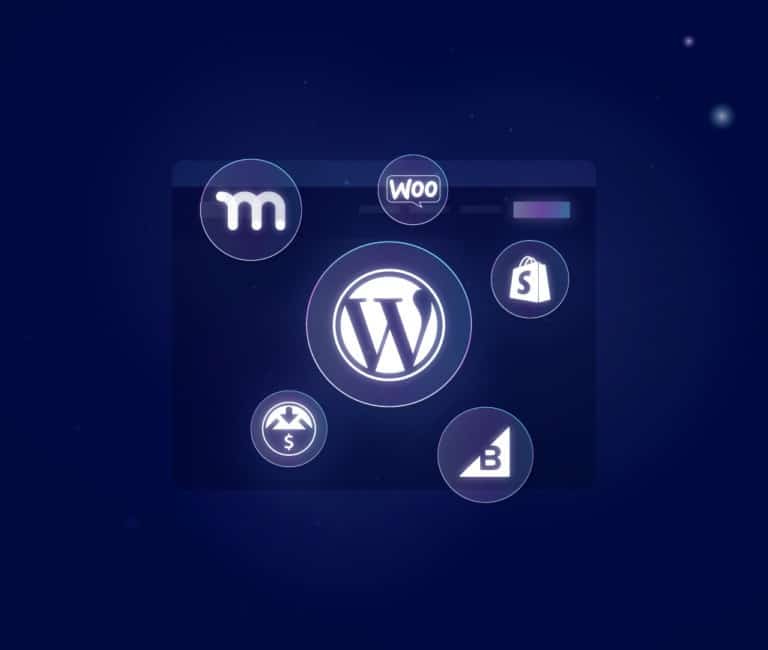Ecommerce
1 minute read
The 5 Best WordPress Ecommerce Plugins of 2023.
LAST UPDATED:
August 15, 2023


Setting up an eCommerce store can be both exciting and overwhelming. Choosing the right platform is crucial for smooth operations and profitability. WordPress is a popular option for online stores, with many eCommerce plugins to choose from, but deciding on the right plugin can feel like a daunting task.
This list compares five popular WordPress eCommerce plugins of 2023, including their features, advantages and disadvantages. Additionally, we assess other factors such as customization options and customer support to aid in your decision-making process.
Considerations when selecting a WordPress eCommerce Plugin
When selecting a WordPress eCommerce plugin for your website, it is crucial to take into account the type of products you will be offering and the features you require. If your intention is to sell digital products, such as music, eBooks, and photos, it would be beneficial to search for a plugin specifically designed for this type of commerce platform. These applications will enhance your protection against pirated content and provide a more streamlined user experience for potential customers browsing your online marketplace. If you plan to sell physical goods that require shipping, you should select an eCommerce software that is specifically designed for it. If you operate a drop-shipping business, you may require real-time inventory support, securely integrated payment platforms, and scalability features to handle surges in demand or traffic during special occasions. It is crucial to ensure that the chosen WordPress eCommerce solution includes all the necessary tools and additional add-ons for efficient online operations.
What are the requirements for operating an eCommerce website?
Choosing the right hosting provider is important for a successful eCommerce website. Your hosting plan must be able to handle the resource demands of an online shop while fulfilling all of your other needs. Some stand-out affordable options are SiteGround and Bluehost; with SSL certificates, dedicated IPs, and support lines, they help tight budgets make sales. For those with more resources, WPEngine, a managed WordPress hosting provider, offers better performance.
After selecting your website host, it’s time to buy your domain name. This will be the URL used by customers to access your site, so make it memorable and catchy. With these requirements met, you’re one step closer to launching your own eCommerce website. Congrats!
Five Recommended eCommerce Plugins for WordPress
Picking the right eCommerce platform for your WordPress site can be tough. Luckily, there are plenty of eCommerce plugins to help. They come in a range of options, from pre-built and easy-to-use to customizable and advanced. These choices fit varying budgets and needs, so keep your use case in mind. This article will explain some of these options:
- WooCommerce
- Easy Digital Downloads
- MemberPress
- BigCommerce for Wordpress
- Shopify
Let’s dive into each!
1. WooCommerce
WooCommerce is the top open-source eCommerce platform for online stores. It’s a popular WordPress plugin that offers great customization options. Developers prefer it and it’s now available for specialized hosting solutions, providing better performance and reliability.
In 2015, Automattic acquired WooCommerce, a service for hosting blogs, greatly improving the platform’s user experience and technology. As a result, the customer base has grown and third-party developers have created many extensions for WooCommerce stores. This, along with a passionate community of supporters, has made WooCommerce a leading eCommerce solution for small business owners and web designers.
Benefits of WooCommerce
Overall, WooCommerce is a great WordPress eCommerce plugin. It has many extensions and themes available, so you can easily add features and customize your design to reflect your brand or message. With WooCommerce, you can sell both physical and digital products like ebooks, music, and software. It’s a simple way to create an online store with just one plugin.
Additionally, WooCommerce simplifies inventory management by tracking stock levels and assigning a store manager. It also offers great functionality for external or affiliate products, making it easy to include them on your website. This eCommerce plugin has all the features you need to start selling online without any extra plugins.
Cons of Using WooCommerce
WooCommerce has many options, which can be overwhelming for new users. It takes time to learn how everything works and find suitable add-ons, and some themes work better with the plugin than others. To use WooCommerce fully, you need a theme made for your needs.
2. Easy Digital Downloads
Easy Digital Downloads (EDD) is a user-friendly platform for selling digital products on WordPress. It has simple features and lets you create a highly customized store for your needs. Not only is EDD easy to configure and use but with its continued growth there are now various hosting options out there which have EDD pre-installed so that setting up a store from scratch can be done in no time. Whether you’re selling software, music files, or courses, EDD makes the process much faster by automating the checkout process and other parts of your website’s workflow.
Pros of Using Easy Digital Downloads
- Easy To Use – EDD is incredibly user-friendly, making it easy for anyone to set up a store regardless of their experience with WordPress. This makes it much easier to find the features you need and make sure they are all focused on selling your specific types of products.
- Integrations – EDD also has a lot of great integrations with third-party services such as PayPal and Stripe, making it simple to accept payments on your website. Additionally, EDD integrates with some popular WordPress plugins such as Gravity Forms and WPForms for added functionality.
- Multiple Payment Options – EDD offers a range of payment options, which makes it easier for customers to purchase your products. This includes payments through PayPal, credit cards, and even cryptocurrency.
- Extensive Reporting – EDD also offers extensive reporting options so you can keep an eye on your store’s performance. This will help you make sure that everything is running smoothly and that your store is making money.
- Extensions – There are a range of extensions available which you can use to add additional features to your store. This includes things such as discounts and coupons, customer management tools, and email marketing integrations.
- Software Licensing – EDD also offers software licensing so you can sell products which need to be activated after purchase. This is particularly useful for those who are selling software, as it adds an extra layer of security.
- Themes – EDD also has a range of compatible themes available so you can easily customize the look and feel of your store.
Cons of Using Easy Digital Downloads
- No Physical Goods – Unfortunately, EDD does not support the sale of physical goods, so if you want to sell anything other than digital items you’ll need to look elsewhere.
- No Shipping Options – Since EDD is focused on digital products, it doesn’t come with any shipping or delivery options built-in. If you want to offer the ability for customers to collect their purchased items in person then this isn’t an option with EDD.
- Fewer Add-ons – EDD has fewer add-ons than WooCommerce does, so it might not be able to offer the same level of customization and features that WooCommerce can.
- Limited Support – Although the documentation for EDD is very comprehensive, the support provided by the developers is limited. This means that if you run into any issues while setting up your store or managing it in the long run, you may not be able to get help right away.
3. MemberPress
MemberPress is a powerful WordPress plugin designed to help users create and manage subscription services and digital products. With its easy-to-use membership plugin, you can limit access to your content, create coupons and discount codes, handle payment processing, set up recurring payments, and more. It also allows for integration with many other platforms such as WooCommerce. While you might be tempted to jump head first into building your product or service on MemberPress, there are pros and cons that should be considered first.
Pros of Using MemberPress
- Easy To Use – Setting up and managing a store with MemberPress is incredibly easy. The user interface is simple and intuitive, meaning that even those without any technical knowledge should be able to get up and running in no time.
- Integration With Other Services – MemberPress also integrates with many other platforms such as WooCommerce and MailChimp which makes it easier to manage your store and keep in touch with customers.
- Powerful Access Rules – With MemberPress you can easily limit access to your content, giving you full control over who has access and when. This is particularly useful for those selling subscription-based products or services.
- Built-in Course Builder – MemberPress also comes with a built-in course builder so you can easily create online courses for your customers.
Cons of Using MemberPress
- Limited Payment Options – Unfortunately, MemberPress does not offer support for all payment gateways. This means that if you want to use a payment gateway other than Stripe, PayPal, and Authorize.net, then you may have to look elsewhere.
- No Physical Product Support – As with EDD, MemberPress does not support the sale of physical goods. If you’re looking to sell anything other than digital items then you’ll need to look elsewhere.
- No Physical Product Support – MemberPress does not support the sale of physical products, so if you want to sell anything other than digital items then you’ll need to look elsewhere.
- No Shopping Cart Feature – Unlike WooCommerce, MemberPress does not have the ability to add multiple items to a cart before the checkout process starts. Instead, customers will need to purchase each item individually which can lead to more abandoned purchases due to people getting distracted or frustrated.
- More Expensive – Although MemberPress does offer a lot of powerful features, it is more expensive than some other WordPress eCommerce plugins. This could be a dealbreaker for those on a tight budget.
- Not Open Source – Unlike WooCommerce or Easy Digital Downloads, MemberPress is not an open-source plugin which means that customizing the code to suit your needs could prove difficult.
- Yearly Pricing – One of the biggest drawbacks to MemberPress is that the pricing model is based on yearly subscription. This means that if you want to use the service for a longer period of time, you may end up paying more than you’d like.
4. BigCommerce
BigCommerce is an eCommerce platform that offers a great solution for businesses looking to integrate their WordPress site with a powerful and scalable eCommerce solution. It has powerful plugins available to extend the functionality of your site while simultaneously keeping pages secure, loading quickly and managing content effectively. It enables easy sign-in, shopping cart system, accounts page and much more with very minimal effort.
Pros of Using BigCommerce
- High scalability – BigCommerce is one of the most scalable eCommerce solutions available. It allows you to easily handle large amounts of traffic and orders without crashing or slowing down your website.
- Integrated Payment Options – BigCommerce comes with integrated payment gateway options like PayPal and Stripe which makes it easier to accept payments from customers.
- Flexible Shipping Options – With BigCommerce, you can easily create custom shipping rules to ensure that customers get their orders quickly and efficiently.
- Advanced Features – BigCommerce has a wide range of features such as customer segmentation, marketing automation, abandoned cart recovery and more. This means you can develop a more advanced eCommerce site than with some other solutions.
- Less Maintenance – BigCommerce requires less maintenance than other eCommerce solutions as it takes care of most of the technical aspects for you. This allows you to focus more on increasing sales and improving customer service.
- Sell across Multiple Channels – BigCommerce allows you to easily list and sell your products across multiple channels, including Amazon, eBay and Facebook. This makes it easier to reach a wider audience and increase sales.
- Advanced Security – BigCommerce takes security seriously and provides customers with a secure payment gateway. It also comes with two-factor authentication, SSL encryption, fraud detection and more to protect your business and customers’ data.
- Customer Service – BigCommerce has an excellent customer service team that is available 24/7 to help you out when you need it. They can help with any technical problems or queries you may have.
- No transaction charges – One of the great advantages of BigCommerce is that it doesn’t charge any transaction fees. This means you can keep more of your profits.
Cons of Using BigCommerce
- Limited Integrations – BigCommerce integrates with all the top third-party apps and tools. However, its app store is still growing, and you may not find an integration for some less popular apps.
- Yearly Sales Threshold – Each plan has a sales threshold that must be met annually. Once the threshold is reached, the next plan will be activated. Watch out! As your business expands, so will the price tag.
- Pricing – BigCommerce is one of the more expensive WordPress eCommerce plugins available. Although it offers a lot of features, this may make it too expensive for some users.
- Complex Setup – BigCommerce is a powerful platform and can be quite complex to set up. It may require professional help to ensure you get everything configured correctly.
- Not Open Source – As with many other eCommerce platforms, BigCommerce isn’t open source which means customizing the code and adding features can be difficult.
5. Shopify
Shopify is another popular eCommerce platform that provides an easy and efficient way to build an online store. It is a great choice for those who are looking for a comprehensive solution with lots of features, as well as those who need extra help in setting up their store. Shopify also has powerful built-in features such as inventory management, marketing automation and customer segmentation.
Pros of Using Shopify
- Super Easy for Beginners – Shopify is incredibly user-friendly and easy to use even if you’ve never created an online store before.
- Supports Both Digital and Physical Goods – Whether you’re selling physical goods like shirts or digital downloads like music, Shopify can handle it all.
- Complete Inventory Management – Shopify comes with an inventory editor and bulk importer combined with an order tracker which makes managing inventory a breeze.
- Payment and Shipping Options – Shopify offers payment and shipping options that simplify the process for accepting credit cards online and in person. Additionally, their shipping system is integrated with popular providers like USPS, which can streamline your fulfillment process.
- Facebook Store and Buyable Pins – Shopify offers integration with various platforms, including Facebook Store and Buyable Pins on Pinterest, allowing users to create online stores and enable purchasing directly on those platforms.
- Wide Range of Apps – customize your store, add features and expand its functionality with Shopify’s myriad apps. With these apps, you can create unique customer experiences, personalize product recommendations, create loyalty programs, and much more. The Shopify app store provides hundreds of options for you to choose from and with new apps being added regularly, you’ll never run out of ideas!
Cons of Using Shopify
- No Free Plan – Unlike some other eCommerce options, there’s no free plan available with Shopify. You’ll have to pay the monthly fee regardless of how much you sell.
- Price – Shopify is a bit more expensive than other eCommerce platforms. The basic plan starts at $29/month, but you’ll want to upgrade for the full features. The higher-tier plans can be quite pricey, and if you need additional features like advanced analytics or abandoned cart recovery, you may have to pay extra for them.
- Transaction Fees – Shopify charges a transaction fee for each sale made on their platform. This can be quite costly if you’re making a lot of sales.
- Limited Support – Shopify provides excellent customer service, but they don’t offer 24/7 support like some other providers do.
- No Shipping Discounts – Shopify doesn’t offer any discounts on shipping rates which means that customers may avoid buying your products.
In Conclusion
Choosing the right eCommerce plugin for your WordPress site can be a daunting task. There are so many options out there and it can seem overwhelming to decide which will work best for your needs. The plugins listed above are all excellent choices, but the one you choose should depend on the type of store you’re looking to create and the features you need. If you’re looking for a comprehensive solution with lots of features, Shopify is a great choice. However, if you’re looking for an easy setup with fewer features and don’t mind paying transaction fees, then WooCommerce may be the better option. Ultimately, it all comes down to your individual needs and preferences.
Get Memorable Insights.
Sign up to receive actionable web design advice directly in your inbox monthly.
Get Memorable Insights.
Sign up to receive actionable web design advice directly in your inbox monthly.
Author
Jeff Gapinski is the President of Huemor where he helps plan the long-term strategic growth of the agency. Jeff is passionate about UI/UX, demand generation, and digital strategy.
What Do You Think?
Have feedback? Maybe some questions? Whatever it is, we'd love to hear from you.



![Website Design Standards We Follow [That You Should Too!]](https://huemordev.b-cdn.net/wp-content/uploads/2021/12/2023.04.04.Website-Design-Standards-We-Follow-That-You-Should-Too.jpg)



No comments found